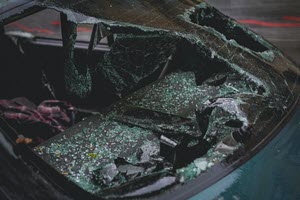Posted in Automobile, Blog, Israel F. Piedra, News & Articles, Personal Injury

It’s a common occurrence: one driver yields the right of way and waves another driver into traffic. Most of the time, the first motorist is doing a favor to the second driver by allowing them to go. And most of the time, the act is greatly appreciated. It is even considered a mark of a courteous driver. However, sometimes the second motorist is subsequently involved in a car accident. In those situations, the well-intentioned “waving driver” might be subject to legal liability.
In New Hampshire, every person must refrain from causing personal injury and property damage to other persons. In the context of driving, motorists have a duty “to use ordinary care to prevent injury to others.” Howland v. Cressy, 95 N.H. 205, 207 (1948). The extent of that duty depends on the circumstances. If a driver fails to use ordinary care under the circumstances, he or she will be deemed negligent.
The New Hampshire Supreme Court has stated that, “absent special circumstances,” a driver who signals another motor vehicle operator to proceed owes no “duty of care to other motorists on the roadway.” Williams v. O’Brien, 140 N.H. 595, 596 (1995). Put another way, the “mere act of signaling does not, by itself, create a duty to insure the safety of other operators on the highway.” That said, a duty does exist if the signaling driver knows (or should know) of “special circumstances which create, or could reasonably create, a foreseeable risk of harm” to the second car or other motorists. Id. For example, if the signaling driver knows (or should know) that the signalee (i.e., car being waved on) has obstructed visibility of other motorists on the highway, “then the signaler assumes a duty to exercise reasonable care in giving a signal.” The basis for this rule of law is the principle that “one who voluntarily assumes a duty” — such as, for example, signaling another driver that it is safe to proceed – “thereafter has a duty to act with reasonable care.” Carignan v. N.H. Int’l Speedway, 151 N.H. 409, 413 (2004).
Essentially, the duty imposed on a signaling driver is adjudged on a case by case basis. There may be a duty when “a special relationship indicating heightened reliance exists” (for instance, if the signaler is a police officer), where “the parties are not driving in ordinary circumstances” (like during a snowstorm), or “there exist other unusual obstacles or obstructions in the roadway (for example, passing a truck where the path ahead is obscured).” Williams, 140 N.H. at 599.
The Williams case involved a signalee driver who came out into traffic and was then struck by a third motorist. It was the third motorist who was severely injured, and the third motorist sued the signaling driver. Although the Court affirmed dismissal of the complaint against the signaling driver, it did so because no “special circumstances” had been identified which would have imposed a duty on the signaling driver. The Court was clear that under different circumstances the signaling driver could have a duty of care to not only the signalee (car being waved on), but also to third party motorists.
The Williams court did not discuss whether there would be a different standard of care as between the signaling driver and the signalee versus the signaling driver and a third party. Courts in other jurisdictions have reached different conclusions; indeed, some state that, as a matter of law, the signaling driver owes no duty to third party motorists period. However, it appears that the majority of jurisdictions hold negligent signalers liable, even to “third” parties. Lokey v. Breuner, 243 P.3d 384 (Mont. 2010).
In negligent signaling cases, it is the jury’s responsibility to determine whether the hand gesture in question was reasonably interpreted by the other driver as a sign that it was safe to proceed. Woods v. O’Neil, 767 N.E.2d 1119 (Mass. App. Ct. 2002).
CONCLUSION
If you were injured because another driver waved you out into traffic, you may have claims against both the signaling driver and the motorist that collided with you. The possibility of another defendant/responsible party is especially important if one of the drivers was uninsured or has insufficient insurance coverage to compensate you for your injuries. Although not all states allow a cause of action for “negligent signaling,” New Hampshire Supreme Court precedent is clear that — at least under certain circumstances — such a claim is viable.
If you were the victim of a car accident, contact us for a free consultation. We handle most personal injury cases on a contingency fee basis: you don’t pay any attorney’s fees unless we successfully recover a verdict or settlement. Welts, White & Fontaine, PC is Nashua’s largest law firm and has decades of experience handling car accident lawsuits and claims. We represent clients statewide.
Contact Welts, White & Fontaine, PC by calling (603) 883-0797 or writing to us here.
Author: Israel F. Piedra
This blog is intended for informational use only. The information contained herein should not be construed as offering legal advice or a legal opinion.
